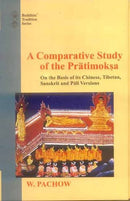SPECIFICATION:
- Publisher : Motilal Banarsidass Publishers
- By : W. Pachow
- Cover : Hardcover
- Language : English
- Edition : 2007
- Pages : 256
- Weight : 500 gm
- ISBN-10 : 8120815726
- ISBN-13 : 978-8120815728
DESCRIPTION:
The Pratimoksa is a code of Buddhist monastic disciplinary rules governing the daily conduct and decorum of bhiksus (monks). It was established by the Buddha on various occasions out of necessity. This work discusses the historical cultural, religious and social issues in ancient India in relation to the rationale of formulating particular precepts. Depending on the special circumstances some of the rules may be enforced or suspended. On the basis of this code the Buddhist Sangha has the authority to impose punishment on the offender which ranges from expulsion to sanctions of probation, penance, forfeiture, repentance or confession. By effectively enforcing the code of Pratimoksa and observing the fortnightly recitation ceremony related to this text, the Sangha may attain the fruition of purity, harmony and spiritual liberation. This study has made an extensive comparison of the various versions belonging to different Buddhist sects in Sanskrit, Pali, Chinese and Tibetan languages. As a sequel it reveals how in a period of several centuries this code had expanded from 218 rules of the Mahasanghikas to 263 of the Sarvastivadins. Viewing the text from the historical perspective one may better understand the significance of the legal, social and religious life of the Buddhist Sangha.Description
SPECIFICATION:
- Publisher : Motilal Banarsidass Publishers
- By : W. Pachow
- Cover : Hardcover
- Language : English
- Edition : 2007
- Pages : 256
- Weight : 500 gm
- ISBN-10 : 8120815726
- ISBN-13 : 978-8120815728
DESCRIPTION:
The Pratimoksa is a code of Buddhist monastic disciplinary rules governing the daily conduct and decorum of bhiksus (monks). It was established by the Buddha on various occasions out of necessity. This work discusses the historical cultural, religious and social issues in ancient India in relation to the rationale of formulating particular precepts. Depending on the special circumstances some of the rules may be enforced or suspended. On the basis of this code the Buddhist Sangha has the authority to impose punishment on the offender which ranges from expulsion to sanctions of probation, penance, forfeiture, repentance or confession. By effectively enforcing the code of Pratimoksa and observing the fortnightly recitation ceremony related to this text, the Sangha may attain the fruition of purity, harmony and spiritual liberation. This study has made an extensive comparison of the various versions belonging to different Buddhist sects in Sanskrit, Pali, Chinese and Tibetan languages. As a sequel it reveals how in a period of several centuries this code had expanded from 218 rules of the Mahasanghikas to 263 of the Sarvastivadins. Viewing the text from the historical perspective one may better understand the significance of the legal, social and religious life of the Buddhist Sangha.Payment & Security
Your payment information is processed securely. We do not store credit card details nor have access to your credit card information.


